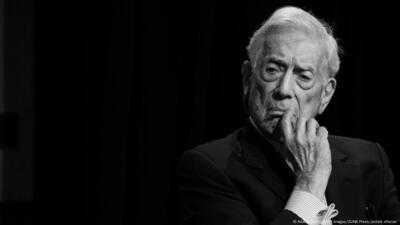

Peruvian author Mario Vargas Llosa, who wrote more than 30 novels including "The Time of the Hero," was one of Latin America's most significant novelists.Peruvian writer Mario Vargas Llosa died on Sunday, 14 April, 2025, aged 89. The Nobel laureate died in Peru's capital Lima surrounded by his family and "at peace," his son Alvaro Vargas Llosa, a well-known political commentator, said on X. Rumors of the writer's deteriorating health had spread in recent months, during which he had been living out of the public eye. Vargas Llosa was a leading figure in Latin America's1960s literary scene. He continued to write novels and essays for decades, with his works being translated into many languages. Vargas Llosa was granted honorary doctorates, prizes and awards worldwide throughout his lifetime. The most prestigious award was undoubtedly the Nobel Prize for Literature in 2010, which the Swedish Academy awarded him for "his cartography of the structures of power and his trenchant images of the individual's resistance, revolt and defeat." "We would be worse than we are without the good books we have read, more conformist, not as restless, more submissive, and the critical spirit, the engine of progress, would not even exist. Like writing, reading is a protest against the insufficiencies of life," said Vargas Llosa in his acceptance speech at the Swedish Academy in Stockholm on December 7, 2010. "Good literature erects bridges between different peoples, and by having us enjoy, suffer, or feel surprise, unites us beneath the languages, beliefs, habits, customs, and prejudices that separate us," he added. In 2016, he became the first living Spanish-speaking writer to be included in France's Bibliotheque de la Pleiade, a venerable collection of universal classics translated into French, and he was elected a member of the prestigious Academie Francaise in 2021. Important voice of Latin American literature Born Jorge Mario Pedro Vargas Llosa to a middle-class family on March 28, 1936 in Arequipa, Peru, he spent the early years of his childhood in Bolivia before returning to his native country. As a teenager, he attended a military academy in Lima, and soon started working as a local journalist. A student of law and literature, Vargas Llosa started to write short stories first published in the late 1950s. He moved to Paris in 1959, and lived there for several years. Set among the cadets of the military school he attended as a teenager, Vargas Llosa's first novel, the 1963 "The Time of the Hero" (La ciudad y los Perros), was immediately successful. Three years later, he published his second novel, "The Green House" (La Casa Verde), also set in Peru. It confirmed him as a key voice of Latin American literature. Over the decades, he gave his readers many more works, including the 1981 "The War of the End of the World" (La Guerra del Fin del Mundo), and the 2000 political thriller, "The Feast of the Goat" (La fiesta del Chivo). Politically active, with a Spanish nobility title The Peruvian writer lived in many cities abroad, and taught at universities in the US, South America and Europe. From 1976-1979, Vargas Llosa was President of the PEN International association of writers. Vargas Llosa was politically active throughout his career. Like many writers of his generation he was a Marxist in his youth, but became disillusioned with the movement and turned to liberal democracy. The novelist ran for the Peruvian presidency in 1990, but was not elected. He became a citizen of Spain, and in 2011, King Juan Carlos I granted the author the legal status of hereditary nobility with the title of Marquess of Vargas Llosa. In a 2020 video interview with Louisiana Channel, a Danish website, the novelist warned that "images have been replacing ideas as the great protagonists of contemporary culture," a phenomenon he found worrying, "because if images entirely replace ideas, the powers of this world will very easily manipulate society." Personal life made tabloid headlines Mario Vargas Llosa was married twice; his second marriage to his first cousin, Patricia, lasted for more than 50 years. In 2015, the winner of the Noble Prize for Literature turned into the number one target of the tabloid press when his romance with Isabel Preysler, singer Julio Iglesias' ex-wife and the widow of Spain's ex-economy minister Miguel Boyer, was made public, and he left his wife Patricia Llosa after 50 years of marriage. In 2022, Preysler and Vargas Llosa separated. 'Curious cosmopolitan' "Vargas Llosa is a curious cosmopolitan who has a clear interest in phenomena that occur around the world, and at the same time he actively partakes in them. That explains his presidential run in Peru or why at his age he continues to fervently write about issues in Venezuela or Mexico," Jürgen Dormagen, a longtime editor of Vargas Llosa's work at the German Suhrkamp publisher, said on the occasion of the Nobel laureate's 80th birthday. In 2019, the author published his latest novel, "Harsh Times" (Tiempos Recios), about the 1954 coup in Guatemala. The acclaimed writer's very first children's book, "Fonchito and the Moon," was published in 2022. That same year, he told CNN he was working on a novel about popular Peruvian music. Mario Vargas Llosa once quoted his ex-wife Patricia as saying, "Mario, the only thing you're good for is writing." He said he took that as a compliment, and in fact, he never stopped devoting most of his time to what he called, back in Stockholm in 2010, "the passion, the vice, the marvel of writing." Edited by: Elizabeth Grenier